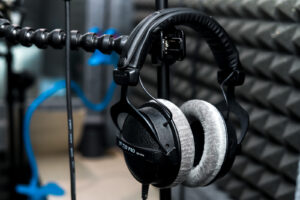Spoiler alert – this blog post title is misleading. Sorry, not sorry. I mean, what does perfect even mean?! Does the perfect ‘voice’ exist? I don’t think so. Some people think having the perfect voice for podcasting is about having a naturally pleasant or soothing voice. Others that it’s being able to articulate your words clearly, project your voice, and get to the end of the sentence in one breath. Well, I’m here to disagree. *steps onto soap box
Having the ‘perfect’ voice for podcasting is about sounding like you. That’s what’s important. Your podcast should sound like you. That is easier said that done, but I’ve popped a few tips below to get you started and inspire you to have confidence in the voice you have on the mic:
- Warm-up exercises: Before recording, do simple vocal warm-up exercises like humming, lip trills, and tongue twisters. This will help settle nerves, loosen you up and get your voice raring to go. Have a go at this short warm up I made especially for podcasters. You’re welcome.
- Forget about diction: If you’re thinking about perfect pronunciation, you’re not focusing on your overall message. Humans are used to listening to flawed, imperfect conversations, and you don’t need to hit every sound in every phrase. If anything, it sounds weird. So focus on who you’re speaking not how you’re saying the words, and it’ll free you up to really share your message.
- Be passionate: Let your emotion and enthusiasm for the topic come out! That’s what the listener is there for. You and your expertise. This will vary your tone and pitch to keep your listeners engaged. Sod being professional and measured – you’re there to get someone pumped up about something so let that passion flow.
- Have confidence: If you’re making a podcast it’s because you’ve got something to say. Believe in it. Your listeners will trust it and believe in you.
- Record and listen back: Record your voice and listen back to it. Sure, it’ll feel cringe-worthy at first and you’ll want to hide behind the sofa, but it does get easier, I promise! You’ll learn how your voice sounds on the mic and how it comes over to the listener in contrast to how you thought you sounded. The more you know your voice, the more you’ll be able to harness its range and expression.
I know it’s a bit controversial to say things like forget about the diction but ultimately, you have to sound like you. This can take time. But every time you’re on the mic is another exciting chance to explore what you can bring. So get stuck in!





